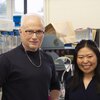2023-12-14
- The School of MCB is proud to recognize outstanding members of its community at the annual holiday celebration. On Dec. 7, 2023, several faculty and staff were presented awards for their valuable contributions by School of MCB Director Milan Bagchi, Deborah Paul Professor of Molecular & Cellular Biology.
Congratulations to this year's winners!
Research Excellence Award
Jie Chen
Teaching Excellence Award
Anna Sokac
Service Excellence Award
Brenda Wilson
Most Accomplished SMCB Graduate Student Award
Aatiqa Nawaz
Most Valuable Undergraduate Instructional Staff Award
Shawna Naidu...
- 2023-11-30 - The School of Molecular & Cellular Biology and Department of Biochemistry are pleased to welcome Dr. Yan Zhang as assistant professor of biochemistry. Dr. Zhang joined us in November 2023 from the University of California, San Francisco, where she conducted her postdoctoral research. Tell us about your lab and your research focus, including how you came to choose or specialize in this area. The overarching goal of my research is to uncover the fundamental principles underlying...
- 2023-11-27 - Antibodies—proteins that are produced by our immune system to protect us—are crucial for recognizing and getting rid of unwanted substances, or antigens, in our body. Although their role is universal, antibody structure varies in different animals. In a new study, researchers have analyzed the antibody Immunoglobulin M in rainbow trout to shed light on why these proteins may have evolved over time. In humans, IgM consists of five repeating units that are held together by a joining chain, resulting in a star shape. Consequently, IgM can bind to multiple antigens at the same time, clearing...
- 2023-11-27 - The School of Molecular & Cellular Biology and Department of Microbiology are pleased to welcome Dr. Nkrumah Grant as assistant professor of microbiology. Grant joined us in November 2023 from Michigan State University and the University of Idaho, where he conducted his postdoctoral research. Tell us about your lab and your research focus, including how you came to choose or specialize in this area. My lab combines evolutionary theory, microbiology, molecular genetics, and genomics, to understand...
- 2023-11-21 - Estrogen receptor-positive breast cancer is the most common form of breast cancer, affecting approximately 75 percent of breast cancer patients. In advanced and metastatic form, it is lethal, claiming the lives of nearly 350,000 individuals annually. Presently, no drug is able to eradicate these advanced tumors. University of Illinois Urbana-Champaign researchers Paul Hergenrother and David Shapiro are working to change that with the anticancer compound...
- 2023-11-16 - The School of Molecular & Cellular Biology is pleased to announce the winners of its annual Undergraduate Research Symposium held Nov. 2, 2023. MCB faculty conduct leading research programs in biochemistry, cell and developmental biology, microbiology, and molecular and integrative physiology. Being an undergraduate researcher provides valuable experience for students, who develop skills in conducting research, communication, leadership, project management, and more. The experience also prepares students for graduate school or a possible career in research....
- 2023-11-09 - When confronted with infection or injury, our body rallies to fight and heal itself and inflammation is a key part of this early defense system. But inflammation can also go awry, as exhibited in chronic illnesses such as obesity and type 2 diabetes. Biochemistry professor Lin-Feng Chen has spent years working to understand the regulation behind the immune system’s inflammatory response. Scientists have known that NF-kB (nuclear factor kappa B) is an important transcription factor regulating innate and...
- 2023-11-06 - University of Illinois researchers have elucidated a mechanism whereby gastric cells detect and respond to toxin infiltration within the cell’s powerhouse, the mitochondria. The Blanke lab, within the Department of Microbiology in the School of Molecular & Cellular Biology, studies the gastric pathogen Helicobacter pylori, or H. pylori, which chronically infects the human stomach as the single most important risk factor for development of stomach cancer. Exactly how the bacterium can sustain long-term infection in the hostile environment of the...
- 2023-10-31 - The School of Molecular & Cellular Biology and Department of Biochemistry are pleased to welcome Chang Cui as an assistant professor of biochemistry. She joins us in November 2023 from Harvard University, where she conducted her postdoctoral research. We recently spoke with Professor Cui about her research and teaching interests and how she enjoys spending her time outside the lab. Tell us about your lab and your research focus, including how you came to choose or specialize in this area. We study...
- 2023-10-30 - The School of Molecular & Cellular Biology is saddened to share news about the passing of Mary Jane Beasley, research specialist, lab manager, and enthusiastic supporter of the school, its departments, and the University of Illinois Urbana-Champaign. Mary Jane Beasley, known to all as MJ, was a dedicated, productive, and talented Research Specialist/Lab Manager, said Benita Katzenellenbogen, Swanlund Professor of Molecular and Integrative Physiology. Prior to joining Katzenellenbogen’s lab, Beasley worked with biochemistry professors I.C. Gunsalus and Lowell Hager. “She was a key member...
- 2023-10-24 - Hypopituitarism occurs when the pituitary gland, a small, pea-sized gland at the base of the brain, does not make enough hormones that are essential for growth, metabolism, and reproduction. Lori Raetzman, a professor of molecular and integrative physiology in the School of Molecular & Cellular Biology, focuses much of her research on understanding pituitary gland development and related diseases like hypopituitarism. In recent years, she...
- 2023-10-22 - In early October, the School of Molecular & Cellular Biology hosted a lecture featuring Nobel Laureate, Dr. Venki Ramakrishnan. Dr. Venki Ramakrishnan received the Nobel Prize in Chemistry in 2009 for his work on “studies of the structure and function of the ribosome.” In 2000, Ramakrishnan reported the structure of the 30S subunit of the ribosome in a thermophile bacteria called Thermus thermophilus. The discovered structure is important because it shows how ribosomes can translate RNA to protein in a precise matter. Ramakrishnan shared this award with Ada E. Yonath and Thomas...
- 2023-10-20 - Host tissues and medical devices are ideal surfaces for bacterial pathogens to colonize and infect. Fluid flow is thought to flush bacteria off these surfaces, but University of Illinois researchers have found that some bacteria can strengthen their adhesion to the surface when flow is applied. In the Sanfilippo lab, researchers study bacteria in fluid flow by utilizing interdisciplinary approaches from biology, chemistry, physics, and engineering. Human pathogens like Pseudomonas aeruginosa adhere well to surfaces in flow-rich parts of the body such as the bloodstream, lungs, and...
- 2023-10-19 - Coming into the University of Illinois Urbana-Champaign, Catherine Koterba was a pre-med student with a passion for astronomy. Three years later, she is a microbiologist studying thermophilic archaea from the hot springs of Yellowstone National Park. On the surface, this appears to be quite the career shift. Yet, for Catherine, this transition was simply the product of a deep-rooted drive to try new things and a relentless persistence to get involved with the topics that generated the most interest. “My true, overarching passion is space,” says the senior molecular and cellular biology major...
- 2023-10-12 - In a new study, University of Illinois scientists have shown how a specific group of neurons respond to information about an animal’s energy state and external challenges to regulate anxiety, fear, and similar behavior. The findings, published in the Journal of Neuroscience, suggest these neurons could be a potential target for better understanding the neurobiology of anorexia nervosa and other disorders related to metabolism and psychiatry. Patrick Sweeney, a professor of...














